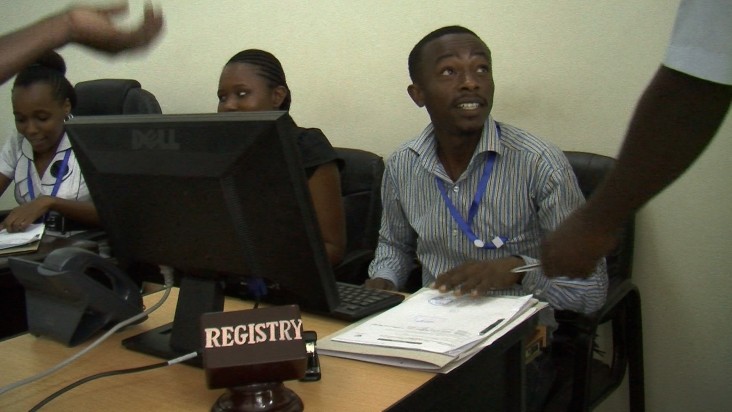
Charles Majura used to spend days speeding through the congested streets of Dar es Salaam on his motorbike collecting stamps from various government offices spread around town. Even when he found the proper office, he couldn’t be confident that the government officer would be there. Failure to collect the proper stamps cost freight forwarders like Majura time. That time translates to lost money for East African businesses, congestion for the Tanzania Port Authority (TPA) and lost revenue for the government of Tanzania.
In June 2012, the One Stop Center (OSC), a USAID/East Africa (USAID/EA) supported initiative, put an end to Majura’s endless tours through town. Now, instead of spending several days to clear cargo at the Dar es Salaam Port, Majura finishes his paperwork within hours.
The OSC ensures that all 10 necessary government agencies are present and ready to execute their duties. One such agency is represented by David Nyangwe, a 16-year veteran officer for the Ministry of Livestock and Fisheries Development. “It’s been simplified,” he says of the new process.
Freight forwarder Lilian Luanda is thrilled that “the OSC has reduced excessive movements” and says that she is “friendly with government agents for the first time.”
The OSC is an example of the soft infrastructure that the USAID/EA Competitiveness and Trade Expansion (COMPETE) Trade Hub accomplishes. The Trade Hub works with the public and private sectors to build relationships and human capacity that streamline operations and make routine procedures more efficient. With minimal hard infrastructure investment—USAID contributed $50,000 to equip the OSC—the Trade Hub and its partners improved trade at a crucial entry and exit point for all goods traveling from Tanzania west to Rwanda and the Democratic Republic of Congo, and south through Zambia and Malawi.
The OSC also reduces corruption and encourages collaboration. Its small office promotes transparency and proximity makes communication easy. Waheed Saudin, executive councilor of the Tanzania Freight Forwarders Association, notes that, “The level of corruption has gone down tremendously. They all see what each other are doing.” Saudin said that more freight forwarders now use formal channels because it is easier. TPA Senior Commercial Officer Robert Soko agrees: “We used to clear the paperwork of around 25 agents a day. We now clear more than 100.”
The OSC has reduced congestion at the Port of Dar es Salaam through greater efficiency. Freight forwarders are happier and both the private and public sectors of Tanzania have increased revenues. To further the impact of the OSC and continue improved transparency, the Trade Hub created a procedure manual for the port. In addition to being able to find the government agents they need, businesses now have a guide to the paperwork and costs associated with clearing cargo at the Port of Dar es Salaam.







Comment
Make a general inquiry or suggest an improvement.